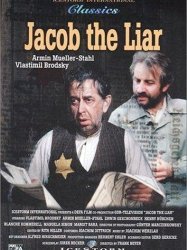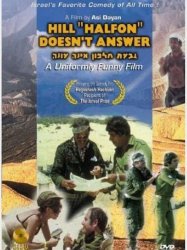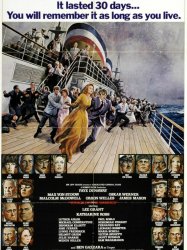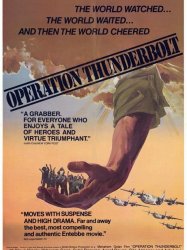Films with theme "Films about Jews and Judaism", sorted by revenue

Jacob the Liar (1975)
, 1h36Directed by Frank Beyer
Origin Tchecoslovaquie
Genres Drama, War, Comedy, Comedy-drama, Historical
Themes Films about religion, Political films, Films about Jews and Judaism
Actors Vlastimil Brodský, Erwin Geschonneck, Henry Hübchen, Blanche Kommerell, Peter Sturm, Dezső Garas
In a Jewish ghetto in German-occupied Poland, a man named Jakob is summoned to the Gestapo office on a charge he broke the curfew. As the soldier who sent him there merely played a prank on him, he is released, but not before hearing a radio broadcast about the defeats of the German Army. As no one believes he went to the Gestapo and came out alive, Jakob makes up another tale, claiming he owns a radio – a crime punishable by death. He then starts encouraging his friends with false reports about the advance of the Red Army toward their ghetto. The residents, who are desperate and starved, find new hope in Jakob's stories. But it all ends as the Germans deport the people to their death in the extermination camps.

The Night Porter (1974)
, 1h58Directed by Liliana Cavani
Origin Italie
Genres Drama, War, Romance
Themes Medical-themed films, Psychologie, Films about religion, Films about sexuality, Erotic films, BDSM in films, LGBT-related films, Films about psychiatry, Political films, Films about Jews and Judaism, LGBT-related films, LGBT-related film
Actors Dirk Bogarde, Charlotte Rampling, Philippe Leroy, Gabriele Ferzetti, Isa Miranda, Giuseppe Addobbati
It is 1957, 12 years after World War II. Maximilian Theo Aldorfer (Dirk Bogarde), a former Nazi SS officer who had pretended to be a doctor in order to be able to take sensational photographs in the concentration camps, and Lucia Atherton (Charlotte Rampling), a concentration camp survivor who had an ambiguous sadomasochistic relationship with Aldorfer. Flashbacks show Max tormenting Lucia, but also acting as her protector.

Hester Street (1975)
, 1h30Directed by Joan Micklin Silver
Origin USA
Genres Drama, Historical, Romance
Themes Films about religion, Films about Jews and Judaism
Actors Carol Kane, Steven Keats, Doris Roberts, Joanna Merlin, Lin Shaye, Bert Salzman
Hester Street tells the story of Jewish immigrants who come to the Lower East side of New York City in 1896 from Europe and who live on Hester Street in Manhattan. When Yankle first comes to the U.S., he quickly assimilates into American culture and becomes Jake. He also begins to have an affair with Mamie, a dancer. His wife, Gitl, who arrives later with their son, Yossele, has difficulty assimilating. Tension arises in their marriage as Jake continually upbraids and abuses Gitl, despite her efforts to assimilate. Additionally, Jake continues to see Mamie, which Gitl later discovers through Mrs. Kavarksy, a neighbor. Eventually, Jake and Gitl divorce, however in turn, Gitl takes all of Mamie's money and marries Bernstein, a faithful traditionalist. By the end of the film she is sartorially and lingually assimilated-walking down the street with Bernstein and Yossele (now known as Joey), speaking English and showing her hair. But she is now liberated from Jake, who in turn has married Mamie.

The Hiding Place (1975)
, 2h30Directed by James F. Collier
Origin USA
Genres Drama, War, Historical
Themes Films about religion, Political films, Films about Jews and Judaism
Actors Julie Harris, Eileen Heckart, Arthur O'Connell, David de Keyser, Nigel Hawthorne, Cyril Shaps
As the Nazis invade the Netherlands in 1940, Corrie and her family allow Jews to hide in a part of their home that is specially remodeled by members of the Dutch resistance. However, the Nazis eventually discover that Corrie and her family are hiding Jews, and on February 28, 1944, the entire family and their friends are arrested after their betrayal by a Dutch collaborator. The hidden Jews are never found by authorities. Corrie's father, Casper, dies before he reaches the concentration camp, and Corrie worries that she will never see her home again. The Nazis send Corrie and her sister, Betsie, to the Ravensbrück concentration camp in Germany for hiding Jews in their home. At the concentration camp, Betsie encourages Corrie to remain hopeful that God will rescue them from the brutalities they experience. With little food and constant work, the women suffer constantly, and Corrie's sister Betsie (Julie Harris), dies. Ultimately, Corrie (Jeanette Clift George) leaves the camp in December, 1944 through what is discovered years later to have been a clerical error, as everyone else in her group of prisoners was gassed the following month (January, 1945). Her life after this ordeal was dedicated to showing that Jesus' love is greater than the deepest pit into which humankind finds itself.

Late Summer Blues (1987)
, 1h41Origin Israel
Genres Drama, Romance
Themes Films set in Africa, Films about religion, Political films, Films about Jews and Judaism

The Dreamers (1987)
, 1h49Directed by Uri Barbash
Themes Films about religion, Films about Jews and Judaism
Actors Kelly McGillis, John Shea, Christine Boisson, Robert Pollock, Amos Lavi
In 1919, a group of idealistic Jewish pioneers from Europe, including Austrian doctor Anda (Kelly McGillis) and her Russian violinist lover Marcus (John Shea) who was a former yeshiva student and became a fervent Labor Zionist after the murder of his family in a pogrom, arrive in Palestine and attempt to establish a kibbutz in the Galilee. Their dream ends up shattered as they attempt to cope with the hardships of the land, sexual and ideological tensions within the group, and hostile confrontations with their Arab neighbours. Finally, the film dramatizes their disappointment as they must come to terms with the gaps between their utopian vision and reality.
 , 1h42
, 1h42Genres Drama
Themes Films about religion, Political films, Films about Jews and Judaism
Actors Tony Curtis, Katharina Thalbach, Matthias Habich, Karin Baal, Charles Régnier, Alexandra Stewart

Halfon Hill Doesn't Answer (1976)
, 1h32Directed by Assi Dayan (אסי דיין)
Origin Israel
Genres Comedy
Themes Films set in Africa, Films about religion, Political films, Films about Jews and Judaism
Actors Yisrael Poliakov, Tuvia Tzafir, Hana Laszlo, Reuven Adiv, Menachem Zilberman
Staff Sgt. Raphael "Gingy" Moked is ordered by his company commander, Captain Shamgar, to retrieve Sergio Constanza, a deserter from reserve service. On his way he meets his girlfriend Yaeli and offers to talk to her father, Victor Hasson, to get a blessing for their relationship. Hasson gives his blessing, believing that Moked came for his older daughter Shifra, but throws him out of the house after finding out this was not so. Yaeli does not wish to part from Moked, and sneaks into a suitcase in his jeep. Meanwhile, Constanza tricks several other gamblers into losing thousands of dollars, which he intends to use to repay his debt to Mr. Hasson. The gamblers find out about the plot however, which leaves Sergio with no choice but to run away to the army with Moked.

Mr. Klein (1976)
, 2h3Directed by Joseph Losey
Origin France
Genres Drama, War, Thriller, Historical, Crime
Themes Films about religion, L'usurpation d'identité, Political films, Films about Jews and Judaism, Escroquerie, Histoire de France, L'Occupation allemande en France, La condition juive en France sous l'Occupation allemande
Actors Alain Delon, Michael Lonsdale, Jeanne Moreau, Juliet Berto, Francine Bergé, Jean Bouise
Paris, January 1942. France is occupied by the Nazis. Robert Klein, apparently apolitical, is a well-to-do art dealer, Roman Catholic and Alsatian by birth, who takes advantage of French Jews who need to sell artworks to raise cash to leave the country. One day, the local Jewish newspaper, addressed to him, is delivered to his home. He learns that another Robert Klein who has been living in Paris, a Jew sought by the police, has had his mail forwarded to him in an apparent attempt to destroy his social reputation and make him a target of official anti-Semitism. He reports this to the police who remain suspicious that he may be reporting this scheme to disguise his own true identity. His own investigations lead him in contradictory directions, to Klein who lives in a slum while having an affair with his concierge and to Klein who visits a palatial country estate where he has seduced an apparently Jewish married woman. When the art dealer cannot locate the other Klein, authorities require him to offer proof of his French heritage. While waiting for the documentation to arrive, he struggles to track down his namesake and learn his motivation. Before he can resolve the situation by either means, he is caught up in the July 1942 roundup of Parisian Jews. He is reunited with Jews who once were his clients as they board boxcars for Germany.

Voyage of the Damned (1976)
, 2h35Directed by Stuart Rosenberg
Origin United-kingdom
Genres Drama, War
Themes Seafaring films, Films about religion, Transport films, Political films, Films about Jews and Judaism
Actors Faye Dunaway, Oskar Werner, Lee Grant, Max von Sydow, James Mason, Malcolm McDowell
Based on actual events, this film tells the story of the 1939 voyage of the MS St. Louis, which departed from Hamburg carrying 937 Jews from Germany, ostensibly to Havana, Cuba. The passengers, having seen and suffered rising anti-Semitism in Germany, realised this might be their only chance to escape. The film details the emotional journey of the passengers who gradually become aware that their passage was planned as an exercise in propaganda, and that it had never been intended that they disembark in Cuba. Rather, they were to be set up as Pariahs, to set an example before the world. As a Nazi official states in the film, when the whole world has refused to accept them as refugees, no country can blame Germany for the fate of the Jews.

Operation Thunderbolt (1977)
, 2h4Directed by Menahem Golan
Origin Israel
Genres Drama, Thriller, Documentary, Action, Historical
Themes Films set in Africa, Films about religion, Films about terrorism, Transport films, Aviation films, Political films, Films about Jews and Judaism, Dans un avion, Films about hijackings
Actors Yehoram Gaon, Gila Almagor, Assi Dayan (אסי דיין), Sybil Danning, Klaus Kinski, Shaike Ophir
In July 1976, Air France flight 139 from Tel Aviv to Paris via Athens was hijacked by four terrorists, two of whom are West Germans named Wilfried Boese (Klaus Kinski) and Halima (Sybil Danning), and the other two are Palestinians. After landing to refuel in Libya, the four hijackers force the plane to take off and to land thousands of miles away at the airport in Entebbe, Uganda, at the invitation of the Ugandan leader Idi Amin (Mark Heath). The two Germans and two Arab hijackers are joined at the Entebbe Airport by at least three more Palestinian terrorists. The Jewish passengers are separated and held hostage in demand to release many terrorists held in Israeli prisons. After much debate, the Israeli government sent an elite commando unit, under the command of Colonel Yonatan Netanyahu (Yehoram Gaon), to raid the airfield and release the hostages. The film is based on fact and follows the events following the flight's takeoff until the hostages' return to Israel.

Trees Cry for Rain (1989)
, 33minutesGenres Documentary
Themes Films about religion, Documentaire sur une personnalité, Documentary films about religion, Films about Jews and Judaism

Origin USA
Genres Documentary
Themes Films about racism, Films about religion, Documentary films about racism, Documentary films about law, Documentary films about war, Documentary films about historical events, Documentaire sur une personnalité, Documentary films about religion, Political films, Films about Jews and Judaism, Documentary films about World War II

Abraham's Gold (1990)
, 1h35Directed by Jörg Graser
Genres Drama
Themes Films about religion, Political films, Films about Jews and Judaism
Actors Hanna Schygulla, Günther Maria Halmer, Otto Tausig

Father (1990)
, 1h40Directed by John Power
Genres Drama
Themes Films about religion, Political films, Films about Jews and Judaism
Actors Max von Sydow, Julia Blake, Carol Drinkwater, Steve Jacobs, Nicholas Bell
The film starts showing an open pit full of shot naked bodies somewhere in Lithuania around the time of the Second World War. A young Iya Zetnick crawls out of the bodies in tears, apparently having survived a massacre.
 Connection
Connection